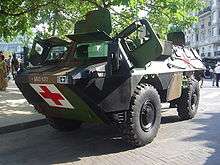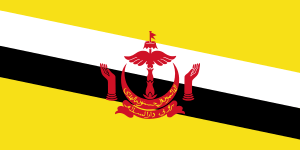Véhicule de l'Avant Blindé
| Véhicule de l'avant blindé | |
|---|---|
|
French VAB on display | |
| Type | Armoured personnel carrier |
| Place of origin | France |
| Service history | |
| In service | 1976 – present |
| Used by | France and numerous others |
| Wars |
Lebanese Civil War Gulf War 2001 invasion of Afghanistan Operation Serval |
| Production history | |
| Designer | GIAT Industries |
| Specifications | |
| Weight | 13.8 tonnes (13.8 tonnes loaded) |
| Length | 5.98 m (19 ft 7 in) |
| Width | 2.49 m (8 ft 2 in) |
| Height | 2.06 m (6 ft 9 in) |
| Crew | 2 |
| Passengers | 10 |
|
| |
| Armour |
Steel armour providing protection against 7.62 mm bullets Upgrades with MEXAS composite armour and mine protection |
Main armament | 1 × AA52 7.62 mm machine gun |
| Engine |
Renault MIDR 062045 235 kW (320 hp)[1] |
| Power/weight | 17 W/kg (23 hp/t) |
| Suspension | wheeled |
| Ground clearance | 0.4 m (1 ft 4 in)[2] |
| Fuel capacity | 310 litres[2] |
Operational range | 1,200 km (750 mi)[2] |
| Speed |
110 km/h (68 mph) 2.2 m/s in water[2] |
The Véhicule de l'avant blindé or VAB ("Armoured vanguard vehicle" in French) is an armoured personnel carrier and support vehicle designed by the Euro Mobilité Division of GIAT Industries of France. It entered service in 1976; around 5,000 were produced.[3]
Design
The VAB was designed as a wheeled troop transporter, complementing the tracked AMX-10P. Specifications for the project called for an NBC-proof, amphibious,[4] lightly armoured vehicle to provide infantry with basic protection against shrapnel and light infantry weapons. These features were dictated by its possible usage in the event of an all-out conventional war breaking out against the Warsaw Pact; in particular, the amphibious capabilities were needed to bridge the rivers in Eastern France and in Germany.[5]
Companies Panhard and Saviem/Renault answered the requirement, and the Renault prototype was selected in May 1974,[6] with 4,000 units ordered. The first delivery occurred in 1976, and production continued at a rate of 30 to 40 units a month.[3]
An armoured double-door at the rear allows access to the passenger compartment. Two inward-facing, foldable benches provide seating for 5 soldiers each. The crew enters the front compartment through two lateral hatches, the driver on the left and gunner on the right; two additional hatches in the roof give access to armaments and provide emergency exits. The front windows are bullet-proof and heated. All the windows can be further protected by armoured panels, which can be shut entirely or leaving a small observation slit. The engine is located behind the driver, while the right side of the vehicle is kept free, providing a passageway between the crew and passenger compartments.
 rear doors and crew bench
rear doors and crew bench forwards compartment
forwards compartment
With a modest 13-tonne mass, the VAB can easily be airlifted for deployment abroad.[2] It can pull a 4-tonne trailer. The VAB's large wheels allow it to sustain up to 60% grades and road/rail canting of up to 30%.[7]
Modern versions have more than 1,000 improvements since the first.[8] From 1998, the French Army's VABs underwent three major overhauls:
- replacement of the manual gear by an automatic transmission (T1)
- replacement of the brakes and automatic tire pressurization (T2)
- armour upgrade (T3)
These overhauled vehicles are known as VAB Valorisé. From 1990, the VAB NG (new generation) with improved armour and new engine was offered. In 2003, Renault Trucks Défense took over marketing the VAB from GIAT. At Eurosatory 2010, Renault unveiled the heavier VAB MkII, with more internal space and Level 4 protection.[9]
In Eurosatory 2012; the VAB MkIII was presented publicly, being a new vehicle with better protection against IEDs and anti-vehicle mines.[10]
Armour upgrade
The upgrade of the VAB with MEXAS composite armour aimed at increasing from protection against light infantry weapons to protection against heavy machine guns, typically 12.7 mm projectiles. This increased the weight of the vehicles by about two tonnes, thereby losing its amphibious capabilities.
The amphibious shape of the hull, the relatively light weight and the armour upgrade seem to give the VAB strong resistance against mines. When exposed to an explosion from below, the VAB tends to be lifted in the air, allowing the force of the blast to disperse away from the vehicle. In particular, the hull shape and position of the wheels deflects the shock wave, helping maintain hull integrity.[5]
Turrets
The heavy machine gun version of the VAB carries a M2HB 12.7mm machine gun in an open turret; the light version sports the AA52 7.5mm machine gun in a similar arrangement.

In both cases, the gunner's only protection from incoming fire is an armoured panel on the front and the two halves of the hatch door on the sides, giving little protection against indirect fire, surprise attacks and explosions[11] — or if the VAB rolls over.[12] As of July 2007, all the personnel killed by mines aboard VABs had occupied the gunner position (though serious injuries were sometimes sustained by crewmen inside the hull).[5]
From 2007, the Army head of staff repeatedly requested that remotely operated 12.7mm turrets be fitted on these vehicles, as a crash requirement.[13] A program was launched, scheduling turret and battle command upgrades for over 500 VABs, now labeled VAB TOP (tourelle TéléOPérée). In May 2008, Renault Trucks Defense signed an eight-year, 20 million euro contract with Kongsberg Gruppen of Norway, for equipping the VAB with subsidiary Kongsberg Defence & Aerospace's Protector Remote Weapon Station (RWS).[14] Deliveries were scheduled from 2009 to 2016.[8]
From early 2009 onwards, about 60 VAB-TOP were deployed in Afghanistan, seeing their first combat during the Battle of Alasay. Field experience shows a significant drop in ammunition consumption with the tele-operated turret, whose computer allows the operator to fire efficient single shots, rather than bursts.[15] This partially alleviates concerns raised by the need to reload this turret from outside.[16]
Replacement
Replacement of the VAB is scheduled for around 2020. A diesel-electric vehicle stemming from the EBM10-EBM20 programme is due to be selected. The Armoured Multirole Carrier has been cited as a strong contender.
Combat history

VABs have been deployed in virtually all theatres where French infantry troops were present, notably Kuwait, Côte d'Ivoire, Yugoslavia, and Chad. VABs belonging to the Royal Moroccan Army (FAR) have seen heavy combat during the conflict with Polisario rebels of the Western Sahara. French troops supporting ISAF in Afghanistan also use the VAB. During the Uzbin valley ambush, a VAB was hit by a rocket propelled grenade, with no injuries. One soldier manning the rooftop machine gun of a VAB was later killed when the road collapsed under his vehicle and it rolled over.[17] In March 2009, a VAB driver was killed by a rocket attack during the battle of Alasay.[18]
Variants
Variants may be 4×4 or 6×6 wheels, the 6×6 yielding a 10% increase in cost.[3] The French military only uses 4-wheel versions, while export versions mainly are 6×6s.
- VAB VTT (Véhicule Transport de Troupe) - 4x4 APC version, crew of two and ten passengers.
- VAB TOP (tourelle TéléOPérée) - VTT 4x4 fitted with a Kongsberg Protector (RWS) with 12.7mm machine gun and ceramic add-on armour.
- VAB AZURE (Action en Zone URbaine) - Urban warfare vehicle equipped with a dozer blade and with panoramic periscopes to observe and monitor.
- VAB ELI (élément léger d'intervention) - light recovery vehicle.
- VAB MILAN - French army variant of the VTT, fitted with a pintle mount for the MILAN system at the rear hull roof.
- VAB AT4CS - French army variant of the VTT, used by anti-tank teams armed with the AT4CS 84mm portable rocket launcher.
- VAB ERYX - French army variant of the VTT, used by anti-tank teams armed with the ERYX system.
- VAB RATAC - Artillery target acquisition vehicle, carries a DR-PC 1a RATAC doppler radar with a range of 20 km.
- VAB RASIT - Reconnaissance vehicle, carries the DR-PT 2a RASIT ground surveillance radar.
- VAB PC (Poste de Commandement) - Command vehicle with a crew of 6 and equipped with map tables and additional signals equipment.
- VAB SIR (Système d'Information Régimentaire) - Digital regimental C4ISTAR information system.
- VAB Bromure - Electronic warfare vehicle.
- VAB Echelon - Maintenance and repair vehicle.
- VAB Génie - Engineering vehicle that can be fitted with a light obstacle clearing blade or can be used to tow a trailer with mine-clearing charges.
- VAB SAN (sanitaire) - Armoured ambulance with room for 5 stretchers or 10 sitting passengers.
- VAB Reco - NBC reconnaissance vehicle.
- VAB ATLAS (Automatisation des Tirs et Liaisons Sol-sol pour l'artillerie) - Artillery fire command and control vehicle, successor of the VAB ATILA.
- VAB SGEA (Système de Guerre Electronique de l'Avant) - Electronic warfare variant.
- VAB Rapsodie (Radar d'Acquisition Polyvalent pour la Surveillance et l'Observation Destiné à l'Interarmes) - Reconnaissance vehicle with radar.
- VBR (Véhicule Blindé de Reconnaissance) - Similar to VIB but used by Génie de l’Air and fitted with a Capre turret with 20mm F2 gun.
- VCAC "Mephisto" (Véhicule de Combat Anti-Char) - Anti-tank vehicle, carries the Euromissile Mephisto system with four ready-to-fire HOT anti-tank missiles and eight more in reserve.
- VCI T.20/13 (Véhicule de Combat de l’Infanterie) - VAB equipped with a turret mounted 20 mm gun recovered from old AMX-VCIs and refurbished and intended for fire support and for counter sniping.

- VIB (Véhicule d’Intervention sur Base) - IFV version fitted with the Toucan system, a tele-operated turret fitted with a 20 mm cannon and a AA52 7.62 mm machine-gun. Used by the French Air Force for airfield defence.[13]
- VIT (Véhicule d’Implantation Topographique) - Vehicle for topographic teams of field artillery units.
- VOA (Véhicule d'Observation d'Artillerie) - Artillery observation vehicle, fitted with a turret with day/night observation devices, laser range finder etc. This version is normally found in units equipped with the TR F1 towed 155mm howitzer. The VAB OBS is an improved version.
- VTM 120 (Véhicule Tracteur de Mortier) - Mortar towing vehicle, can carry 70 bombs for the Thomson-Brandt MO-120 mortar.
- VAB 2R2M — self-propelled mortar 120 mm.
- VBC-90: Armoured car variant in service with the Mobile Gendarmerie.
Versions reserved for export:
- VAB 4x4 VCI T.20 (Véhicule de Combat de l’Infanterie) - Export version of the VCI T.20/13, fitted with a one-man T.20 turret. In service with Cyprus.
- VAB 6x6 ECH (ECHelon) - Maintenance vehicle (with crane).
- VAB 6x6 VCI Toucan (Véhicule de Combat de l’Infanterie) - Similar to the VCI T.20/13 but based on the VAB 6x6.
- VAB 6x6 VPM 81 (Véhicule Porte-Mortier) - Mortar carrier with an 81mm mortar firing through a roof opening. In service with Oman.
- VAB 6x6 VDAA TA20 (Véhicule de Défense AntiAérienne) - Low-altitude air-defence vehicle, armed with a double 20mm gun in a TA 20 turret. In service with Oman, Morocco and the Central African Republic.
- VCAC 6x6 UTM800 - Anti-tank vehicle, carries the Euromissile UTM800 turret, with four ready-to-launch HOT missiles, and 16 more in reserve. In service with Qatar and Cyprus.
- VMO (Véhicule de Maintien de l'Ordre) - Police version for crowd control, fitted with a light dozer blade and optionally a TOI turret. In service with Oman, Morocco and Abu Dhabi.
The French Gendarmerie also uses a variant of the VAB, which replaced the VXB, called VBRG (Véhicule Blindé de Reconnaissance de la Gendarmerie) for riot control. This version may be equipped with a water cannon and/or a bulldozer blade.
Foreign-made versions:
- MACK Lakota: A variant of the VAB Mark III, most of its parts made in America by Mack Defense via JWF Defense Systems in 6x6 and 8x8 variants, which was announced in June 2016.[19] It was first shown publicly in AUSA 2014 and AUSA 2015.[20][21] Its hull is also assembled in America.[22] It was sold in 2016 to an unnamed customer.[23]
Gallery
 Medical evacuation version
Medical evacuation version Inside view of the medical evacuation version
Inside view of the medical evacuation version Version with 12.7 mm machine gun
Version with 12.7 mm machine gun Detail of Pod Water Jet for amphibious operation
Detail of Pod Water Jet for amphibious operation MACK Lakota at IDEX 2017
MACK Lakota at IDEX 2017
Operators

Current operators
 France:
France:
- French Army: 3,900 VAB in 35 different versions[5]
- French Air Force (VIB, véhicule blindé d'intervention, or véhicule d'intervention sur base)
 Brunei
Brunei Chad
Chad Central African Republic
Central African Republic Cyprus
Cyprus Georgia Georgian HQ units who are part of the ISAF are using the VAB and VBL in the Kabul area.
Georgia Georgian HQ units who are part of the ISAF are using the VAB and VBL in the Kabul area. Indonesia: Army Corps / TNI-AD
Indonesia: Army Corps / TNI-AD Ivory Coast
Ivory Coast Kuwait
Kuwait Lebanon: Lebanese Armed Forces, Internal Security Forces (Police)[24][25]
Lebanon: Lebanese Armed Forces, Internal Security Forces (Police)[24][25] Mauritius
Mauritius Morocco 400 vehicles[3]
Morocco 400 vehicles[3] Oman
Oman Qatar
Qatar United Arab Emirates
United Arab Emirates Italy: Italian Army (NBC configuration)
Italy: Italian Army (NBC configuration)
Former operators
 Amal Movement militia (1984-1990)[26]
Amal Movement militia (1984-1990)[26]
See also
Notes
- ↑ http://www.renault-trucks-defense.com/description_2000831_0.html?lang=en
- 1 2 3 4 5 VAB, Ministry of Defence
- 1 2 3 4 "1976 RENAULT VAB VCI". charfrancais.net. Retrieved 2009-11-11.
- ↑ propulsion either by wheels, or by two water jets mounted on either side of hull rear
- 1 2 3 4 La bonne surprise du VAB face aux IED : avoir été amphibie..., Jean-Dominique Merchet, Secret Défense, Libération
- ↑ VAB Blindé de transport de troupe - Armoured personnel carrier, armyrecognition.com
- ↑ Véhicule de l'Avant Blindé (VAB), FAS
- 1 2 "VAB (Vehicule de l'Avant Blinde) Wheeled Armoured Fighting Vehicle, France". Army-Technology.com. Retrieved 2009-11-11.
- ↑ http://www.janes.com/events/exhibitions/eurosatory2010/sections/daily/day3/latest-generation-vab.shtml
- ↑ http://www.armyrecognition.com/french_army_france_wheeled_armoured_vehicle_uk/vab_mark_mk_3_mk3_wheeled_armoured_vehicle_personnel_carrier_technical_data_sheet_specifications.html
- ↑ Adjudant Laurent Pican (13 BCA) was killed by an explosion on 21 September 2007
- ↑ Soldier Melam Bouama was killed during the Uzbin valley ambush
- 1 2 Faute de VAB, utilisons les VIB !, Jean-Dominique Merchet
- ↑ Weapon Control Systems framework agreement with France – Kongsberg Gruppen press release, 02.05.2008
- ↑ En Afghanistan, baptême du feu pour le VAB-TOP
- ↑ Destinés à mieux protéger leurs occupants, les premiers VAB-TOP livrés en Afghanistan
- ↑ Merchet, Jean-Dominique (2008-08-19). "Afghanistan: le récit de l'embuscade". Libération. Retrieved 2008-08-22.
- ↑ Fontaine, Caroline (17 March 2009). "Français au combat en Afghanistan". Paris Match. Retrieved 2009-05-04.
- ↑ http://www.armyrecognition.com/us_army_wheeled_and_armoured_vehicle_uk/lakota_6x6_armoured_vehicle_personnel_carrier_technical_data_sheet_specifications_pictures_video_11502174.html
- ↑ http://www.armyrecognition.com/ausa_2014_show_daily_news_coverage_report/mack_defense_to_present_sherpa_light_scout_and_armoured_wheeled_loader_l_180_at_ausa_2014_0610145.html
- ↑ http://web.archive.org/web/20151116083411/http://www.janes.com/article/55513/ausa-2015-mack-defense-sherpa-light-and-lakota
- ↑ http://www.upi.com/Defense-News/2016/06/06/Mack-Defense-JWF-team-for-Lakota-armored-vehicle-production/4201465222105/
- ↑ http://www.armyrecognition.com/ausa_2016_show_daily_news_tv_coverage_report/first_foreign_sale_for_the_mack_defense_lakota_6x6_armoured_personnel_carrier_10310164.html
- ↑ Kassis, Véhicules Militaires au Liban/Military Vehicles in Lebanon (2012), p. 21.
- ↑ Zaloga, Tank battles of the Mid-East Wars (2003), pp. 53; 57-58.
- ↑ Mahé, La Guerre Civile Libanaise, un chaos indescriptible (1975-1990), p. 79.
References
- Christopher F. Foss, Jane’s Tank & Combat Vehicle recognition guide, HarperCollins Publishers, London 2002. ISBN 0-00-712759-6
- Samer Kassis, Véhicules Militaires au Liban/Military Vehicles in Lebanon 1975-1981, Trebia Publishing, Chyah 2012. ISBN 978-9953-0-2372-4
- Steven J. Zaloga, Tank battles of the Mid-East Wars (2): The wars of 1973 to the present, Concord Publications, Hong Kong 2003. ISBN 962-361-613-9
- Yann Mahé, La Guerre Civile Libanaise, un chaos indescriptible (1975-1990), Trucks & Tanks Magazine n.º 41, January–February 2014, pp. 78–81. ISSN 1957-4193 (in French)
External links
| Wikimedia Commons has media related to Véhicule de l'Avant Blindé. |
- "Vehicle recognition (friendly armor): Light armored vehicle identification". GlobalSecurity.org. Retrieved 2008-01-11.